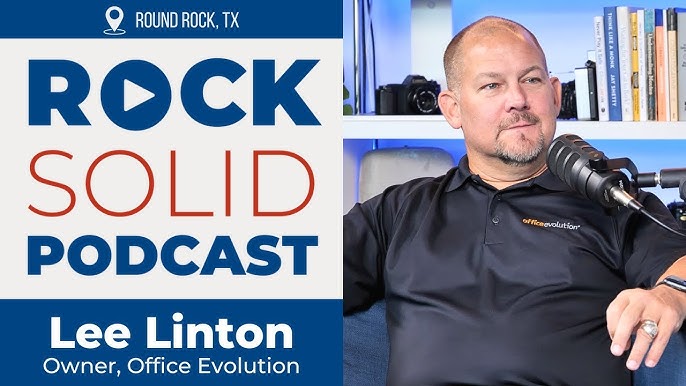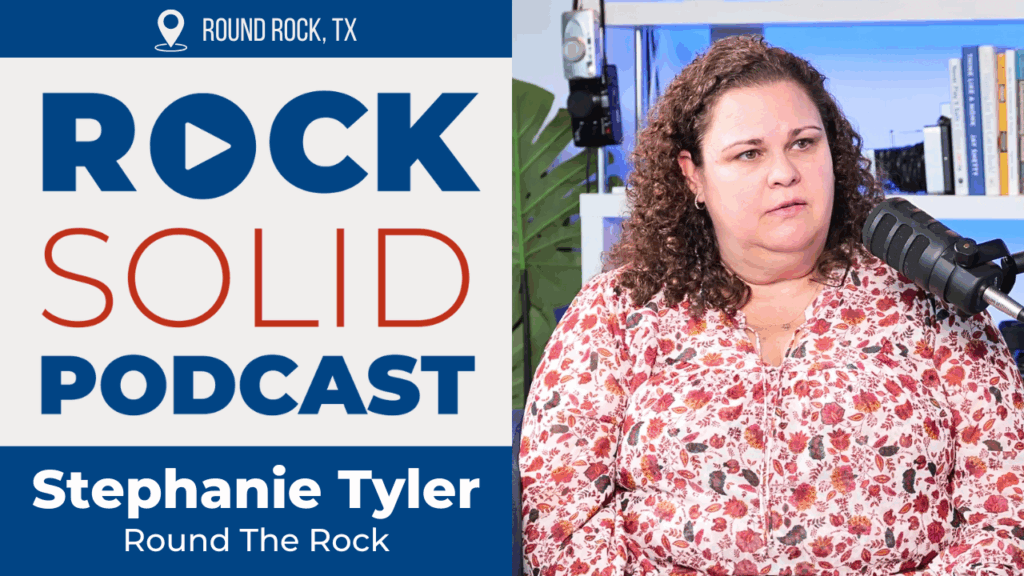Did you ever stop to ask why a fourth-grader needs permission to solve real problems?
Nicholle Walton-Durban asked, and she never looked back. Her answer became E.S.T.E.A.M Academy in Round Rock, TX, a patchwork of micro-schools, Learning Labs, and the Round Rock Children’s Business Fair. Bryan Eisenberg sat across from her on the Rock Solid podcast, eyes bright, notebook ready. She called herself an “edupreneur.” Bryan nodded. He heard the word and pictured parents, teachers, and city leaders holding open doors for kids who already know how to walk through them.
Nicholle builds places where learners run the show. The Socratic guide refuses to rescue. The badge map shows the road, yet every traveler chooses the turns. Kids shoot short films, price lemonade, miss the mark, try again, and brag about their newest bruise. Failure comes early, cheap, and often. That rhythm forges grit faster than any worksheet ever printed.
Bryan pulled three lessons from the conversation and you can put them to work today:
- Start small and messy. Hand a child a camera, a whisk, or a budget of ten bucks. Let the project wobble. Review together, then repeat.
- Protect the question. When a learner asks “why,” answer with, “show me.” Curiosity drives effort. Effort drives mastery.
- Trade oversight for ownership. Post clear standards, then step aside. Peer review and democratic votes teach accountability better than any lecture.
Round Rock proves a city rises when it bets on its youngest citizens. Families choose from strong public schools, micro-schools, and enrichment labs. Entrepreneurs mentor booths filled with fresh logos and first invoices. Eight fairs in, the lines still wrap the block. One eleven-year-old misses her sales goal, tweaks her pitch, and returns stronger the next year. You feel the pulse of a future workforce that already speaks profit-and-loss.
Picture your neighborhood buzzing like that. Ask the hard questions. Offer the space, the tools, and the trust. Kids will fill the rest.
Transcript:
Bryan Eisenberg: Welcome to Rock Solid. I’m here with Nicolle Walton-Durban from E.S.T.E.A.M. Um, I want to jump right into your title. You call yourself an edupreneur. Yes. Why?
Nicholle Walton-Durban: Uh, I’m an entrepreneur whose primary focus and purpose is building, um, empowered educational ecosystems. So whatever I’m working on—in a variety of ways—it’s really focused on education and empowerment. So, an entrepreneur. I-I-I like it. It definitely stands out. And, um, you wear different hats because you have E.S.T.E.A.M Academy, the lab—what’s E.S.T.E.A.M Learning Labs? E.S.T.E.A.M Learning Labs. Uh, we’re about to experience the Children’s Business Fair as well—our eighth. It’s so exciting.
Bryan: Tell me a little more about how all of that came about.
Nicholle: Like most stories, it started with asking myself important questions about my children. My “aha” moment came when my oldest was in fourth grade: What is the purpose of education? What is the purpose of school? What’s on the other side of that journey? Then, What do I really want my children to have when they launch into the world? As an entrepreneur, that answer was simple—critical-thinking and independent-learning skills. You double down on life skills and real-world practical experiences over and over again. That’s empowerment, limitless possibility, a mindset, a skill set. When I couldn’t find it, I started building it with them.
Bryan: What did that process look like? I’m sure it was messy.
Nicholle: It’s still messy ten-plus years later. We do it in many ways, and the mess is what makes it fun—real entrepreneurial, real life. It started when I opened a film school for kids. My husband and I are filmmakers and artists. My kids wanted a place to develop those talents. I’m a huge believer in learning by doing.
Bryan: Yes.
Nicholle: Want to be a filmmaker? Here’s a camera. Go make a film—make a lot of bad ones. Then review, critique, learn, and grow.
Bryan: That’s been today’s theme. This is our second episode recording today. We’re talking about the best advice from entrepreneurs: get things done. My LinkedIn post—by accident—mentioned my first book, Persuasive Online Copywriting (2002). In the dedication we thanked Roy H. Williams and his wife Penny—misspelled “Penny” as P-E-N-Y on purpose. They taught us: Anything worth doing is worth doing wrong.
Nicholle: Exactly. We all know that through the wrong comes growth, perspective, and learning. We need a healthy association with failure. F’s aren’t bad; they’re required. Fail early and often. After failure: critique, review, ask, What’s my opportunity for growth? Then try again—be brave enough to fail again—get better each time.
Bryan: Right.
Bryan: Now, obviously your kids have been at this since day one. What does their experience look like now, years later?
Nicholle: From the film school we launched the academy. I own two micro-schools, both in the Acton Academy network—learner-led. We trust the kids. No adults save them. Socratic guides are contractually forbidden to answer questions. There’s restraint on adults and deep trust in learners. Kids phone a friend; it’s peer-to-peer. They live in the information era—knowledge is here—so it goes to grit, communication, critical thinking, independent learning. After years of that, my kids know themselves, aren’t afraid to take chances, and I don’t worry about them in the world.
Bryan: What are their big dreams right now?
Nicholle: My boys are 21, 17, and 13.
- 21-year-old: Got a good-paying job, saving to buy a house—head down, doing the work, aiming to retire by 40.
- 17-year-old: In our Teen Academy. The NGA badge—Next Great Adventure—has him deep-diving who he is, passions, skills, career with purpose. He’s exploring the music industry: self-taught musician, plays multiple instruments, has a band. I challenge him to look broadly—session musician, film composer (like his dad), audio engineer, podcast production.
- 13-year-old: In our Pathfinder studio (middle/early high school). Focused on working hard, setting goals, accountability. When he levels up to Teen Academy, he’ll know how to work hard, then find his why.
Bryan: You’ve got a mix of middle- and high-schoolers. How does that help with the traditional pressure of moving from middle to high school?
Nicholle: Mixed ages create a powerful dynamic. Middle-school kids face hormones, identity struggles, conflicts between what others want and what they want. We give them tools and normalize struggle. Instead of a victim mindset—“The world is against me”—we say, You can handle this. They learn uncomfortable things: sit down and talk, look someone in the eyes, set and respect boundaries, coexist with people who do things differently. Adults don’t interfere or rescue; we bounce ideas Socratically. The message, no matter if they’re four or seventeen: You have the power within you to overcome this challenge.
Bryan: At what age does this start?
Nicholle: Four. Our day runs 9 a.m.–4 p.m. Doors open 8:30. At 9 every studio goes into Socratic discussion—develops critical thinking. After that, each studio differs, but learners have posted daily schedules, resources, peers, challenges. They set SMART goals, hold leadership roles; it’s a democratic student-gov environment. They maintain standards and judge work quality—no grades, only mastery (100 percent). They review each other’s work, hold each other accountable. Some days look beautifully focused; others look like chaos as they navigate big human emotions—but it’s magical when it clicks.
Bryan: Parents love the skills, but what about general education?
Nicholle: That’s the easiest part. Kids are born learners—every baby asks “why.” Adults often shush that. We flip it: Ask why. Then how. Then try. Then ask why it didn’t work. Learning happens; we just need to stop squashing curiosity. Remove arbitrary age ceilings. When learning ties to their why, they master faster and go further than lectures ever could.
Bryan: So it’s not teachers downloading info.
Nicholle: Correct. No teachers—only Socratic guides who can’t answer questions.
Bryan: What’s that like for parents the first time they see it?
Nicholle: Depends on the parent. 99.9 percent of learners thrive. The challenge is parents—it looks different from what we grew up with. It’s hard to watch kids struggle and trust the process. The three requirements: time, tools, trust. Tools are easy; time and trust are hard. Parents must grow alongside their learner.
Bryan: My middle one chose baseball—lots of failure—learns to be uncomfortable, make mistakes, flush it, move on. He’s eyeing entrepreneurship.
Bryan: Let’s dive into the Children’s Business Fair. I judged it last year and loved it. What inspired it?
Nicholle: The Acton network launched it; we brought it to Round Rock. E.S.T.E.A.M—the E stands for entrepreneurship. The fair lets kids lead. We facilitate the framework, but inside it’s on them—succeed, fail, learn. Eighth year. If you’ve never been, go. I still get chills—kids blow my mind. Even if ideas aren’t great year one or two, it doesn’t matter. We teach entrepreneurial skills and mindset—useful everywhere.
Bryan: One of my favorite business books is Unreasonable Hospitality by Will Guidara. My mentor calls this “business topology.” If you have a customer-service issue, study hospitality.
Nicholle: I’ll check it out. The more opportunities kids get to practice entrepreneurial skills early—even before middle school—the better. Just create opportunity; if they pick it up, great. If not, fine. But don’t limit the opportunity by age.
Bryan: Let’s talk Round Rock. Why is it great for entrepreneurs?
Nicholle: Round Rock is innovative and future-focused yet rooted in identity. Leadership thinks forward. Ten years ago there wasn’t much in this space, so I brought opportunity here and it’s been embraced. Round Rock keeps growing, is family-focused, invests in the next generation.
Bryan: Many move here for the traditional school system, but they also have options.
Nicholle: Round Rock ISD tries to provide top programming. We partner through E.S.T.E.A.M Learning Labs for enrichment. Plus the community offers diverse educational choices—public, charter, micro-schools—so every learner can find what serves their purpose.
Bryan: If people want to learn more about you, the academy, or the business fair, where can they find you?
Nicholle: Visit eastedu.com. From there you’ll find:
- E.S.T.E.A.M Academy (Round Rock)
- Apollo Academy (Tampa, FL)
- E.S.T.E.A.M Learning Labs (camps and after-school)
- F.I.R.E. Foundation (our nonprofit supporting educational ecosystems)
Bryan: Awesome.
Nicholle: Thank you so much.


